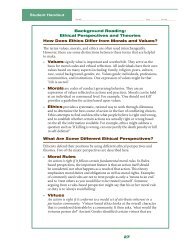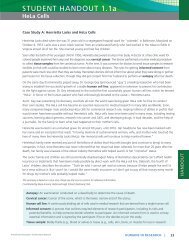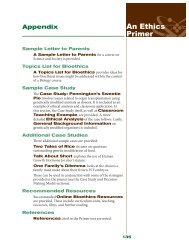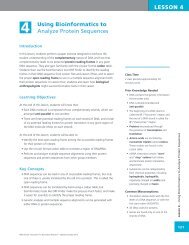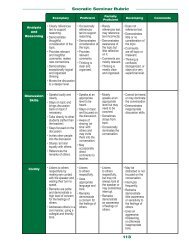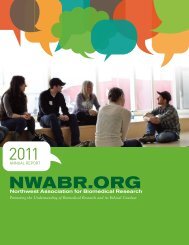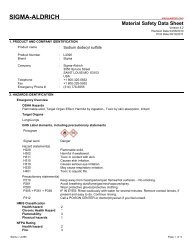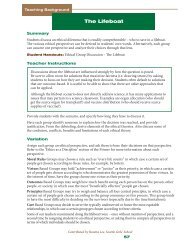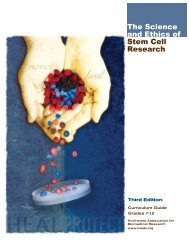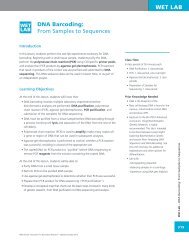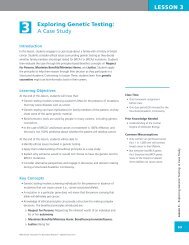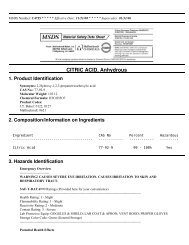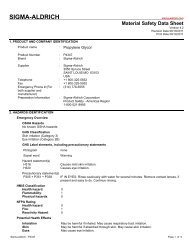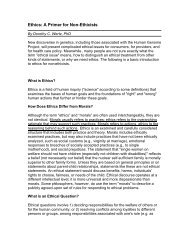LESSON 1: - Northwest Association for Biomedical Research
LESSON 1: - Northwest Association for Biomedical Research
LESSON 1: - Northwest Association for Biomedical Research
Create successful ePaper yourself
Turn your PDF publications into a flip-book with our unique Google optimized e-Paper software.
8. Ask students to group the answers to the questions inStep Five into similar themes, working either individuallyor in their small groups. Have them use Student Handout1.3—Concept Mapping to record the major concepts fromthe class discussion, case study table, and brainstormingactivity. Ask students to consider what they recorded onStudent Handout 1.2—Guiding Questions <strong>for</strong> HistoricalCase Studies, and have them organize the guidelinesfurther, possibly narrowing them down to three or fourmajor categories complete with specific examples fromeach of the case studies to support their themes. The goalis to arrive at themes that parallel those of the Belmontprinciples (see Possible Answers <strong>for</strong> Student Handout1.3—Concept Mapping).9. Working as a class, invite students to share their conceptmap themes. Generate a class concept map that includesexamples from each of the case studies. [Note: A usefulwebsite <strong>for</strong> how to turn a text outline into a concept mapcan be found at http://www.text2mindmap.com. Teachersmay use this resource to create their class concept map.]10. Ask students to go back and fill in any missingelements on their own concept maps (Student Handout1.3—Concept Mapping). Remind students to includespecific examples from each of the case studies to supporttheir themes.CONNECTION TO FORMATIVEASSESSMENTRevisit the statements students sorted in the FormativeAssessment. After completing Lesson One, students shouldunderstand that Statement C is accurate. Careful readingof the Henrietta Lacks case also shows Statement D to beaccurate (this concept will be revisited in the next lessons).GLOSSARYAntibody: A substance made by the body as an immuneresponse that attacks and destroys <strong>for</strong>eign agents, such asviruses and bacteria.Autonomy: A person’s freedom and ability to make his orher own decisions.Autopsy: An examination conducted on a dead body todetermine the cause of death.Belmont Report (Belmont principles): Created in 1978by the U.S. Department of Health, this report establishedthree basic ethical principles to be considered whenhumans participate in research.Beneficence: Minimizing all potential harms and maximizingall potential benefits to the subject as well as to society.Activity Three: The Belmont Report11. Pass out Student Handout 1.4—The Belmont Report.Have students compare their concept map guidelinesto these ethical principles that were developed to guidehuman research.12. Review each of the Belmont principles with the class,and encourage students to note similarities or differencesbetween these principles and those on their concept maps.13. Using Student Handout 1.4—The Belmont Report,ask students to give a concrete example from one ofthe case studies <strong>for</strong> each of the principles found in theBelmont Report.Closure14. Have students compare their class concept map principlesto those found in the Belmont Report. Tell students that theprinciples described in the Belmont Report are sometimesreferred to as the Belmont principles.Cervical cancer: Cancer of the cervix, which is the lower,narrow end of the uterus.Clinical research: Medical research involving humanparticipants to test new medications, treatments, methodsof prevention, and therapies.Coercion: The act of pressuring someone to do somethingusing <strong>for</strong>ce, intimidation, or threats without respect <strong>for</strong>individual choice. This includes the idea that a person withfew choices may find participation in a study to be soappealing that they feel they cannot decline, even if beingin the study is not a good decision <strong>for</strong> other reasons.Conflict of interest: A situation in which someone isresponsible <strong>for</strong> making a decision in an official capacity(e.g., someone holding public office) that could benefitthem personally.Ethics: A field of study that looks at the moral basis ofhuman behavior and attempts to determine the bestcourse of action in the face of conflicting choices.Hepatitis: Inflammation of the liver caused most frequentlyby viruses.© <strong>Northwest</strong> <strong>Association</strong> <strong>for</strong> <strong>Biomedical</strong> <strong>Research</strong>HUMANS IN RESEARCH |19<strong>LESSON</strong> 1



